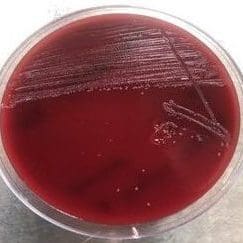
Get A Testing Quote
Bacteroides fragilis
STRUCTURE AND PHYSIOLOGY
Bacteroides fragilis is a Gram-negative, rod-shaped, non-motile bacterium found in the human colon. B. fragilis is an aerotolerant anaerobic bacteria, which allows it to survive in environments with low levels of oxygen. Maintaining a generally beneficial relationship with the host when retained in the gut, B. fragilis has adapted complex surface proteins and other molecular structures, such as lipopolysaccharide chains and outer membrane vesicles, in order to survive and thrive within the human gut environment. B. fragilis has been found to play a key role in food and nutrient breakdown during digestion, allowing for more efficient energy absorption for humans.
TRANSMISSION AND DISEASE
This microorganism is a normal part of the human gut flora but can cause infections if it gets into the bloodstream or surrounding tissues, usually resulting from ruptures of the gastrointestinal tract due to injury or complications during surgery. B. fragilis is responsible for a large number of opportunistic infections in hospitals and contributes significantly to morbidity and mortality.
DISINFECTION
B. fragilis has many mechanisms in place to survive its environment, which makes it a tricky microorganism to kill. This species is known to be evolving a significant amount of resistance to antibiotics including cefoxitin, clindamycin, carbapenems, and fluoroquinolones.
NOTES
Bacteroides fragilis is referenced as one of the required microorganisms on the FDA’s 2016 Consumer Antiseptic Rub proposed rule (81 FR 42912 at 42921).
REFERENCE(S)
Kuwahara T, Yamashita A, Hirakawa H, Nakayama H, Toh H, Okada N, et al. (October 2004). “Genomic analysis of Bacteroides fragilis reveals extensive DNA inversions regulating cell surface adaptation”. Proceedings of the National Academy of Sciences of the United States of America. 101 (41): 14919–14924. Bibcode:2004PNAS..10114919K. doi:10.1073/pnas.0404172101. PMC 522005. PMID 15466707.
Wexler HM (October 2007). “Bacteroides: the good, the bad, and the nitty-gritty”. Clinical Microbiology Reviews. 20 (4): 593–621. doi:10.1128/CMR.00008-07. PMC 2176045. PMID 17934076.
Share

